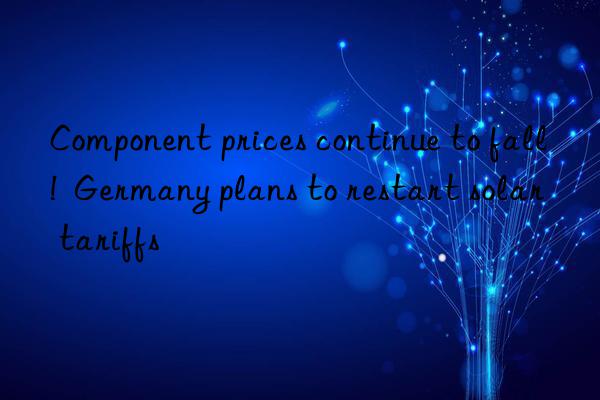
The latest news is that the German government is considering the possibility of setting up trade barriers on Chinese solar modules and power generation equipment imported into Europe, a move that has attracted the attention of the trade organization SolarPower Europe.
According to Reuters, while considering subsidies and state aid, the European Solar Manufacturing Council (ESMC) also issued an open letter calling on the EU to protect European manufacturers from "concentrated dumping by Chinese photovoltaic manufacturers." This comes in the form of an influx of cheap products into Europe, which drive down European prices and force European manufacturers to cut prices.
ESMC made it clear in the letter that Chinese manufacturers have adopted a "dumping stance" against Europe, but did not call for the establishment of trade barriers or the imposition of US-style tariffs. Initiatives by European companies continue to ferment: Chinese components are accused of being dumped at low prices in Europe!
Instead, it outlined a number of "carrot" strategies, such as encouraging in-house purchases and approving acquisitions of European stocks, to offset forced price cuts by Chinese rivals. Additionally, it calls for a ban on the sale of components linked to forced labor, mainly from Xinjiang, China.
Trade body SolarPower Europe also called for measures to protect solar photovoltaic product prices. The agency said the price of solar photovoltaic products has fallen by 25% in recent months, posing "real risks" to European manufacturers.
Germany is the first European country to formally study protectionist measures in the solar manufacturing industry. In 2013, the EU imposed tariffs on Chinese photovoltaic products. At that time, in the field of solar modules and other products, the EU implemented anti-dumping and countervailing measures against Chinese companies for the first time.
Affected by this, China's photovoltaic products exported to Europe have to bear anti-dumping duties of up to 67.9%. But as a result, in the next five years, the number of photovoltaic products from China decreased significantly, and the pace of promoting solar energy deployment in Europe also slowed down.
Having learned from the past, European industry organizations are more rational this time. SolarPower Europe said in response to its statement: "Trade barriers are not the solution. History has proven that conducting investigations and implementing solar trade barriers is the ultimate lose-lose strategy for Europe."
Instead, it calls for measures to reward and incentivize solar manufacturing. Specifically:
-Adjust the EU State Aid Framework (Temporary Crisis and Transition Framework) to allow member states to support the running costs of factories, i.e. operating expenses;
- Allow for specific flexi-tendering within member states under the rapidly adopted EU Net Zero Sector Act;
- Establish an EU-level financing instrument such as a "Solar Manufacturing Bank" specifically for European-produced solar PV.
Aristotelis, President of SolarPower Europe, said: “We need a diverse, sustainable and resilient solar supply chain. Trade barriers are not the way to achieve this. We urge EU leaders to develop and implement a solar industry strategy that This strategy should be as clear and ambitious as the U.S. Inflation Reduction Act (IRA). We are ready with balanced and effective measures."
Gunter Erfurt, Director of the Board of Directors of SolarPower Europe, added: "We must incentivize solar projects that originate from Europe's flexible solar capacity, rather than sanctioning the entire industry through tariffs. In this way, while the European solar manufacturing industry is developing steadily, the application of solar energy is also increasing. There will be no interruptions."
It remains to be seen whether Europe's manufacturing renaissance can materialize; the US IRA has created significant incentives for companies to build factories here, while the EU's Green Deal scheme has not yet reached the same level.
Background supplement: Recently, the European Commission launched an investigation that may lead to the imposition of tariffs to protect EU manufacturers from cheaper Chinese electric vehicle imports. Reuters reports that following new energy vehicles, Germany and other EU countries are preparing to wield a "tariff stick" on photovoltaic products from China to protect European photovoltaic companies.
Meanwhile, Germany is studying options including trade protection to protect local solar manufacturers from falling global prices, a government document seen by Reuters showed.
However, any trade barriers or incentives from Germany may require approval from the European Commission.



 微信扫一扫打赏
微信扫一扫打赏
